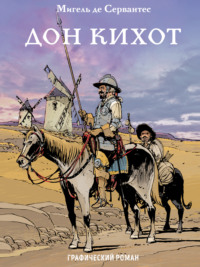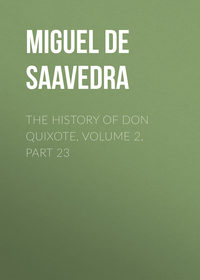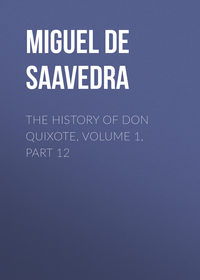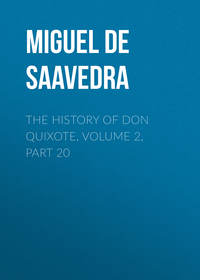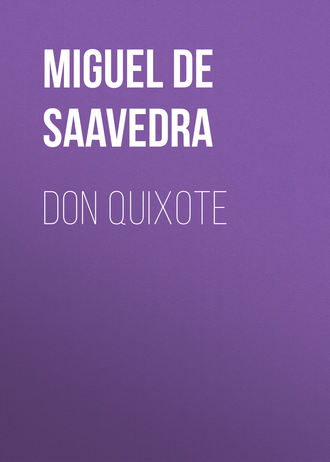 полная версия
полная версияDon Quixote
It seems that as he stood contemplating his enemy she struck him as the most beautiful woman he had ever seen all his life; and the little blind boy whom in our streets they commonly call Love had no mind to let slip the chance of triumphing over a lacquey heart, and adding it to the list of his trophies; and so, stealing gently upon him unseen, he drove a dart two yards long into the poor lacquey's left side and pierced his heart through and through; which he was able to do quite at his ease, for Love is invisible, and comes in and goes out as he likes, without anyone calling him to account for what he does. Well then, when they gave the signal for the onset our lacquey was in an ecstasy, musing upon the beauty of her whom he had already made mistress of his liberty, and so he paid no attention to the sound of the trumpet, unlike Don Quixote, who was off the instant he heard it, and, at the highest speed Rocinante was capable of, set out to meet his enemy, his good squire Sancho shouting lustily as he saw him start, "God guide thee, cream and flower of knights-errant! God give thee the victory, for thou hast the right on thy side!" But though Tosilos saw Don Quixote coming at him he never stirred a step from the spot where he was posted; and instead of doing so called loudly to the marshal of the field, to whom when he came up to see what he wanted he said, "Senor, is not this battle to decide whether I marry or do not marry that lady?" "Just so," was the answer. "Well then," said the lacquey, "I feel qualms of conscience, and I should lay a-heavy burden upon it if I were to proceed any further with the combat; I therefore declare that I yield myself vanquished, and that I am willing to marry the lady at once."
The marshal of the field was lost in astonishment at the words of Tosilos; and as he was one of those who were privy to the arrangement of the affair he knew not what to say in reply. Don Quixote pulled up in mid career when he saw that his enemy was not coming on to the attack. The duke could not make out the reason why the battle did not go on; but the marshal of the field hastened to him to let him know what Tosilos said, and he was amazed and extremely angry at it. In the meantime Tosilos advanced to where Dona Rodriguez sat and said in a loud voice, "Senora, I am willing to marry your daughter, and I have no wish to obtain by strife and fighting what I can obtain in peace and without any risk to my life."
The valiant Don Quixote heard him, and said, "As that is the case I am released and absolved from my promise; let them marry by all means, and as 'God our Lord has given her, may Saint Peter add his blessing.'"
The duke had now descended to the courtyard of the castle, and going up to Tosilos he said to him, "Is it true, sir knight, that you yield yourself vanquished, and that moved by scruples of conscience you wish to marry this damsel?"
"It is, senor," replied Tosilos.
"And he does well," said Sancho, "for what thou hast to give to the mouse, give to the cat, and it will save thee all trouble."
Tosilos meanwhile was trying to unlace his helmet, and he begged them to come to his help at once, as his power of breathing was failing him, and he could not remain so long shut up in that confined space. They removed it in all haste, and his lacquey features were revealed to public gaze. At this sight Dona Rodriguez and her daughter raised a mighty outcry, exclaiming, "This is a trick! This is a trick! They have put Tosilos, my lord the duke's lacquey, upon us in place of the real husband. The justice of God and the king against such trickery, not to say roguery!"
"Do not distress yourselves, ladies," said Don Quixote; "for this is no trickery or roguery; or if it is, it is not the duke who is at the bottom of it, but those wicked enchanters who persecute me, and who, jealous of my reaping the glory of this victory, have turned your husband's features into those of this person, who you say is a lacquey of the duke's; take my advice, and notwithstanding the malice of my enemies marry him, for beyond a doubt he is the one you wish for a husband."
When the duke heard this all his anger was near vanishing in a fit of laughter, and he said, "The things that happen to Senor Don Quixote are so extraordinary that I am ready to believe this lacquey of mine is not one; but let us adopt this plan and device; let us put off the marriage for, say, a fortnight, and let us keep this person about whom we are uncertain in close confinement, and perhaps in the course of that time he may return to his original shape; for the spite which the enchanters entertain against Senor Don Quixote cannot last so long, especially as it is of so little advantage to them to practise these deceptions and transformations."
"Oh, senor," said Sancho, "those scoundrels are well used to changing whatever concerns my master from one thing into another. A knight that he overcame some time back, called the Knight of the Mirrors, they turned into the shape of the bachelor Samson Carrasco of our town and a great friend of ours; and my lady Dulcinea del Toboso they have turned into a common country wench; so I suspect this lacquey will have to live and die a lacquey all the days of his life."
Here the Rodriguez's daughter exclaimed, "Let him be who he may, this man that claims me for a wife; I am thankful to him for the same, for I had rather be the lawful wife of a lacquey than the cheated mistress of a gentleman; though he who played me false is nothing of the kind."
To be brief, all the talk and all that had happened ended in Tosilos being shut up until it was seen how his transformation turned out. All hailed Don Quixote as victor, but the greater number were vexed and disappointed at finding that the combatants they had been so anxiously waiting for had not battered one another to pieces, just as the boys are disappointed when the man they are waiting to see hanged does not come out, because the prosecution or the court has pardoned him. The people dispersed, the duke and Don Quixote returned to the castle, they locked up Tosilos, Dona Rodriguez and her daughter remained perfectly contented when they saw that any way the affair must end in marriage, and Tosilos wanted nothing else.
CHAPTER LVII.
WHICH TREATS OF HOW DON QUIXOTE TOOK LEAVE OF THE DUKE, AND OF WHAT FOLLOWED WITH THE WITTY AND IMPUDENT ALTISIDORA, ONE OF THE DUCHESS'S DAMSELS
Don Quixote now felt it right to quit a life of such idleness as he was leading in the castle; for he fancied that he was making himself sorely missed by suffering himself to remain shut up and inactive amid the countless luxuries and enjoyments his hosts lavished upon him as a knight, and he felt too that he would have to render a strict account to heaven of that indolence and seclusion; and so one day he asked the duke and duchess to grant him permission to take his departure. They gave it, showing at the same time that they were very sorry he was leaving them.
The duchess gave his wife's letters to Sancho Panza, who shed tears over them, saying, "Who would have thought that such grand hopes as the news of my government bred in my wife Teresa Panza's breast would end in my going back now to the vagabond adventures of my master Don Quixote of La Mancha? Still I'm glad to see my Teresa behaved as she ought in sending the acorns, for if she had not sent them I'd have been sorry, and she'd have shown herself ungrateful. It is a comfort to me that they can't call that present a bribe; for I had got the government already when she sent them, and it's but reasonable that those who have had a good turn done them should show their gratitude, if it's only with a trifle. After all I went into the government naked, and I come out of it naked; so I can say with a safe conscience – and that's no small matter – 'naked I was born, naked I find myself, I neither lose nor gain.'"
Thus did Sancho soliloquise on the day of their departure, as Don Quixote, who had the night before taken leave of the duke and duchess, coming out made his appearance at an early hour in full armour in the courtyard of the castle. The whole household of the castle were watching him from the corridors, and the duke and duchess, too, came out to see him. Sancho was mounted on his Dapple, with his alforjas, valise, and proven, supremely happy because the duke's majordomo, the same that had acted the part of the Trifaldi, had given him a little purse with two hundred gold crowns to meet the necessary expenses of the road, but of this Don Quixote knew nothing as yet. While all were, as has been said, observing him, suddenly from among the duennas and handmaidens the impudent and witty Altisidora lifted up her voice and said in pathetic tones:
Give ear, cruel knight; Draw rein; where's the needOf spurring the flanks Of that ill-broken steed?From what art thou flying? No dragon I am,Not even a sheep, But a tender young lamb.Thou hast jilted a maiden As fair to beholdAs nymph of Diana Or Venus of old.Bireno, AEneas, what worse shall I call thee?
Barabbas go with thee! All evil befall thee!
In thy claws, ruthless robber, Thou bearest awayThe heart of a meek Loving maid for thy prey,Three kerchiefs thou stealest, And garters a pair,From legs than the whitest Of marble more fair;And the sighs that pursue thee Would burn to the groundTwo thousand Troy Towns, If so many were found.Bireno, AEneas, what worse shall I call thee?
Barabbas go with thee! All evil befall thee!
May no bowels of mercy To Sancho be granted,And thy Dulcinea Be left still enchanted,May thy falsehood to me Find its punishment in her,For in my land the just Often pays for the sinner.May thy grandest adventures Discomfitures prove,May thy joys be all dreams, And forgotten thy love.Bireno, AEneas, what worse shall I call thee?
Barabbas go with thee! All evil befall thee!
May thy name be abhorred For thy conduct to ladies,From London to England, From Seville to Cadiz;May thy cards be unlucky, Thy hands contain ne'er aKing, seven, or ace When thou playest primera;When thy corns are cut May it be to the quick;When thy grinders are drawn May the roots of them stick.Bireno, AEneas, what worse shall I call thee?
Barabbas go with thee! All evil befall thee!
All the while the unhappy Altisidora was bewailing herself in the above strain Don Quixote stood staring at her; and without uttering a word in reply to her he turned round to Sancho and said, "Sancho my friend, I conjure thee by the life of thy forefathers tell me the truth; say, hast thou by any chance taken the three kerchiefs and the garters this love-sick maid speaks of?"
To this Sancho made answer, "The three kerchiefs I have; but the garters, as much as 'over the hills of Ubeda.'"
The duchess was amazed at Altisidora's assurance; she knew that she was bold, lively, and impudent, but not so much so as to venture to make free in this fashion; and not being prepared for the joke, her astonishment was all the greater. The duke had a mind to keep up the sport, so he said, "It does not seem to me well done in you, sir knight, that after having received the hospitality that has been offered you in this very castle, you should have ventured to carry off even three kerchiefs, not to say my handmaid's garters. It shows a bad heart and does not tally with your reputation. Restore her garters, or else I defy you to mortal combat, for I am not afraid of rascally enchanters changing or altering my features as they changed his who encountered you into those of my lacquey, Tosilos."
"God forbid," said Don Quixote, "that I should draw my sword against your illustrious person from which I have received such great favours. The kerchiefs I will restore, as Sancho says he has them; as to the garters that is impossible, for I have not got them, neither has he; and if your handmaiden here will look in her hiding-places, depend upon it she will find them. I have never been a thief, my lord duke, nor do I mean to be so long as I live, if God cease not to have me in his keeping. This damsel by her own confession speaks as one in love, for which I am not to blame, and therefore need not ask pardon, either of her or of your excellence, whom I entreat to have a better opinion of me, and once more to give me leave to pursue my journey."
"And may God so prosper it, Senor Don Quixote," said the duchess, "that we may always hear good news of your exploits; God speed you; for the longer you stay, the more you inflame the hearts of the damsels who behold you; and as for this one of mine, I will so chastise her that she will not transgress again, either with her eyes or with her words."
"One word and no more, O valiant Don Quixote, I ask you to hear," said Altisidora, "and that is that I beg your pardon about the theft of the garters; for by God and upon my soul I have got them on, and I have fallen into the same blunder as he did who went looking for his ass being all the while mounted on it."
"Didn't I say so?" said Sancho. "I'm a likely one to hide thefts! Why if I wanted to deal in them, opportunities came ready enough to me in my government."
Don Quixote bowed his head, and saluted the duke and duchess and all the bystanders, and wheeling Rocinante round, Sancho following him on Dapple, he rode out of the castle, shaping his course for Saragossa.
CHAPTER LVIII.
WHICH TELLS HOW ADVENTURES CAME CROWDING ON DON QUIXOTE IN SUCH NUMBERS THAT THEY GAVE ONE ANOTHER NO BREATHING-TIME
When Don Quixote saw himself in open country, free, and relieved from the attentions of Altisidora, he felt at his ease, and in fresh spirits to take up the pursuit of chivalry once more; and turning to Sancho he said, "Freedom, Sancho, is one of the most precious gifts that heaven has bestowed upon men; no treasures that the earth holds buried or the sea conceals can compare with it; for freedom, as for honour, life may and should be ventured; and on the other hand, captivity is the greatest evil that can fall to the lot of man. I say this, Sancho, because thou hast seen the good cheer, the abundance we have enjoyed in this castle we are leaving; well then, amid those dainty banquets and snow-cooled beverages I felt as though I were undergoing the straits of hunger, because I did not enjoy them with the same freedom as if they had been mine own; for the sense of being under an obligation to return benefits and favours received is a restraint that checks the independence of the spirit. Happy he, to whom heaven has given a piece of bread for which he is not bound to give thanks to any but heaven itself!"
"For all your worship says," said Sancho, "it is not becoming that there should be no thanks on our part for two hundred gold crowns that the duke's majordomo has given me in a little purse which I carry next my heart, like a warming plaster or comforter, to meet any chance calls; for we shan't always find castles where they'll entertain us; now and then we may light upon roadside inns where they'll cudgel us."
In conversation of this sort the knight and squire errant were pursuing their journey, when, after they had gone a little more than half a league, they perceived some dozen men dressed like labourers stretched upon their cloaks on the grass of a green meadow eating their dinner. They had beside them what seemed to be white sheets concealing some objects under them, standing upright or lying flat, and arranged at intervals. Don Quixote approached the diners, and, saluting them courteously first, he asked them what it was those cloths covered. "Senor," answered one of the party, "under these cloths are some images carved in relief intended for a retablo we are putting up in our village; we carry them covered up that they may not be soiled, and on our shoulders that they may not be broken."
"With your good leave," said Don Quixote, "I should like to see them; for images that are carried so carefully no doubt must be fine ones."
"I should think they were!" said the other; "let the money they cost speak for that; for as a matter of fact there is not one of them that does not stand us in more than fifty ducats; and that your worship may judge; wait a moment, and you shall see with your own eyes;" and getting up from his dinner he went and uncovered the first image, which proved to be one of Saint George on horseback with a serpent writhing at his feet and the lance thrust down its throat with all that fierceness that is usually depicted. The whole group was one blaze of gold, as the saying is. On seeing it Don Quixote said, "That knight was one of the best knights-errant the army of heaven ever owned; he was called Don Saint George, and he was moreover a defender of maidens. Let us see this next one."
The man uncovered it, and it was seen to be that of Saint Martin on his horse, dividing his cloak with the beggar. The instant Don Quixote saw it he said, "This knight too was one of the Christian adventurers, but I believe he was generous rather than valiant, as thou mayest perceive, Sancho, by his dividing his cloak with the beggar and giving him half of it; no doubt it was winter at the time, for otherwise he would have given him the whole of it, so charitable was he."
"It was not that, most likely," said Sancho, "but that he held with the proverb that says, 'For giving and keeping there's need of brains.'"
Don Quixote laughed, and asked them to take off the next cloth, underneath which was seen the image of the patron saint of the Spains seated on horseback, his sword stained with blood, trampling on Moors and treading heads underfoot; and on seeing it Don Quixote exclaimed, "Ay, this is a knight, and of the squadrons of Christ! This one is called Don Saint James the Moorslayer, one of the bravest saints and knights the world ever had or heaven has now."
They then raised another cloth which it appeared covered Saint Paul falling from his horse, with all the details that are usually given in representations of his conversion. When Don Quixote saw it, rendered in such lifelike style that one would have said Christ was speaking and Paul answering, "This," he said, "was in his time the greatest enemy that the Church of God our Lord had, and the greatest champion it will ever have; a knight-errant in life, a steadfast saint in death, an untiring labourer in the Lord's vineyard, a teacher of the Gentiles, whose school was heaven, and whose instructor and master was Jesus Christ himself."
There were no more images, so Don Quixote bade them cover them up again, and said to those who had brought them, "I take it as a happy omen, brothers, to have seen what I have; for these saints and knights were of the same profession as myself, which is the calling of arms; only there is this difference between them and me, that they were saints, and fought with divine weapons, and I am a sinner and fight with human ones. They won heaven by force of arms, for heaven suffereth violence; and I, so far, know not what I have won by dint of my sufferings; but if my Dulcinea del Toboso were to be released from hers, perhaps with mended fortunes and a mind restored to itself I might direct my steps in a better path than I am following at present."
"May God hear and sin be deaf," said Sancho to this.
The men were filled with wonder, as well at the figure as at the words of Don Quixote, though they did not understand one half of what he meant by them. They finished their dinner, took their images on their backs, and bidding farewell to Don Quixote resumed their journey.
Sancho was amazed afresh at the extent of his master's knowledge, as much as if he had never known him, for it seemed to him that there was no story or event in the world that he had not at his fingers' ends and fixed in his memory, and he said to him, "In truth, master mine, if this that has happened to us to-day is to be called an adventure, it has been one of the sweetest and pleasantest that have befallen us in the whole course of our travels; we have come out of it unbelaboured and undismayed, neither have we drawn sword nor have we smitten the earth with our bodies, nor have we been left famishing; blessed be God that he has let me see such a thing with my own eyes!"
"Thou sayest well, Sancho," said Don Quixote, "but remember all times are not alike nor do they always run the same way; and these things the vulgar commonly call omens, which are not based upon any natural reason, will by him who is wise be esteemed and reckoned happy accidents merely. One of these believers in omens will get up of a morning, leave his house, and meet a friar of the order of the blessed Saint Francis, and, as if he had met a griffin, he will turn about and go home. With another Mendoza the salt is spilt on his table, and gloom is spilt over his heart, as if nature was obliged to give warning of coming misfortunes by means of such trivial things as these. The wise man and the Christian should not trifle with what it may please heaven to do. Scipio on coming to Africa stumbled as he leaped on shore; his soldiers took it as a bad omen; but he, clasping the soil with his arms, exclaimed, 'Thou canst not escape me, Africa, for I hold thee tight between my arms.' Thus, Sancho, meeting those images has been to me a most happy occurrence."
"I can well believe it," said Sancho; "but I wish your worship would tell me what is the reason that the Spaniards, when they are about to give battle, in calling on that Saint James the Moorslayer, say 'Santiago and close Spain!' Is Spain, then, open, so that it is needful to close it; or what is the meaning of this form?"
"Thou art very simple, Sancho," said Don Quixote; "God, look you, gave that great knight of the Red Cross to Spain as her patron saint and protector, especially in those hard struggles the Spaniards had with the Moors; and therefore they invoke and call upon him as their defender in all their battles; and in these he has been many a time seen beating down, trampling under foot, destroying and slaughtering the Hagarene squadrons in the sight of all; of which fact I could give thee many examples recorded in truthful Spanish histories."
Sancho changed the subject, and said to his master, "I marvel, senor, at the boldness of Altisidora, the duchess's handmaid; he whom they call Love must have cruelly pierced and wounded her; they say he is a little blind urchin who, though blear-eyed, or more properly speaking sightless, if he aims at a heart, be it ever so small, hits it and pierces it through and through with his arrows. I have heard it said too that the arrows of Love are blunted and robbed of their points by maidenly modesty and reserve; but with this Altisidora it seems they are sharpened rather than blunted."
"Bear in mind, Sancho," said Don Quixote, "that love is influenced by no consideration, recognises no restraints of reason, and is of the same nature as death, that assails alike the lofty palaces of kings and the humble cabins of shepherds; and when it takes entire possession of a heart, the first thing it does is to banish fear and shame from it; and so without shame Altisidora declared her passion, which excited in my mind embarrassment rather than commiseration."
"Notable cruelty!" exclaimed Sancho; "unheard-of ingratitude! I can only say for myself that the very smallest loving word of hers would have subdued me and made a slave of me. The devil! What a heart of marble, what bowels of brass, what a soul of mortar! But I can't imagine what it is that this damsel saw in your worship that could have conquered and captivated her so. What gallant figure was it, what bold bearing, what sprightly grace, what comeliness of feature, which of these things by itself, or what all together, could have made her fall in love with you? For indeed and in truth many a time I stop to look at your worship from the sole of your foot to the topmost hair of your head, and I see more to frighten one than to make one fall in love; moreover I have heard say that beauty is the first and main thing that excites love, and as your worship has none at all, I don't know what the poor creature fell in love with."
"Recollect, Sancho," replied Don Quixote, "there are two sorts of beauty, one of the mind, the other of the body; that of the mind displays and exhibits itself in intelligence, in modesty, in honourable conduct, in generosity, in good breeding; and all these qualities are possible and may exist in an ugly man; and when it is this sort of beauty and not that of the body that is the attraction, love is apt to spring up suddenly and violently. I, Sancho, perceive clearly enough that I am not beautiful, but at the same time I know I am not hideous; and it is enough for an honest man not to be a monster to be an object of love, if only he possesses the endowments of mind I have mentioned."


